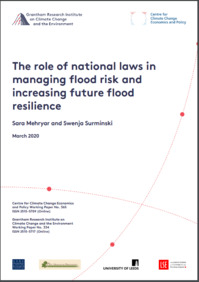The role of national laws in managing flood risk and increasing future flood resilience
| Author: | Mehryar, Sara; Surminski, Swenja |
| Language: | English |
| Published By: | London School of Economics and Political Science |
| Published date: | March 2020 |
×
Thank you for recommending this resource.
Share your resources

Are you working to better understand and build community climate resilience? Others can benefit from your knowledge.
Do you have any question?

Do you need practical advice on something not currently included in the climate solutions catalogue?



Comments